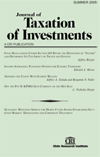Why the U.S. Congress Would Be Making a Colossal Mistake by Banning Tax Patents
Author: Jacob Birnbaum.
Source: Volume 28, Number 03, Spring 2011 , pp.59-88(30)

< previous article |next article > |return to table of contents
Abstract:
Throughout U.S. history, the patent system has served as an unrelenting champion of public disclosure. Also, we have repeatedly seen that public disclosure has been the best disinfectant of wrongdoings in taxation and related fields. Yet, until recently, the field of taxation and the patent system rarely overlapped. In 2010, the U.S. Supreme Court, in Bilski v. Kappos, effectively sanctioned the extension of the patent system into the field of taxation by ruling that patents can be acquired on certain processes or business methods in extraordinarily limited circumstances--including, potentially, on processes or business methods to enable taxpayers to structure their affairs to lower their taxes (i.e., tax patents). However, many tax practitioners, rather than embracing the benefits of the patent system--including its incentivization of greater public disclosure of tax ideas and inventions--have been lobbying Congress to keep the patent system out of tax practice. Their reasoning is largely based on fundamental misconceptions about what tax patents truly are and what they can cover. This article addresses these misconceptions in light of Bilski, examines the patent system’s burden-benefit tradeoff in the field of taxation, and provides detailed information about 20 recently issued tax patents.Keywords: Bilsky v. Kapos; Patent-Eligibility Requirements; 35 U.S.C. Section 101; 705/36T patents; Prop. Treas. Reg. Sec. 1.6011-4
Affiliations:
1: Giordano, Halleran & Ciesla, P.C..